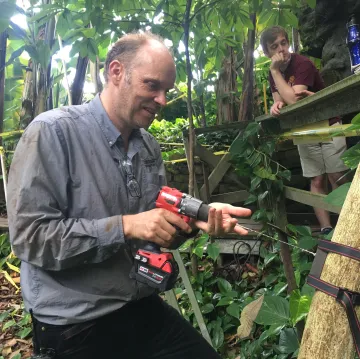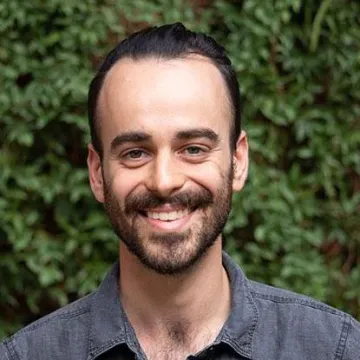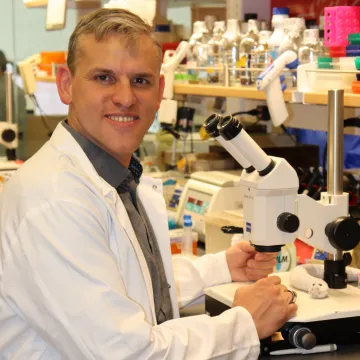Science Café Spring 2020 Goes Virtual!
3-Part Series | Thursdays @ 6pm
Zoom Webinar
We are delighted to announce a 3 part-series of "live" online science talks given by University of Arizona researchers, formerly scheduled to give presentations at one of our four public venues. Each week showcases a different field of cutting-edge science. Follow along as we explore the Biosphere 2 Rainforest, desert grasslands at risk and learn about the fundamentals of aging.

Dr. Joost van Haren
Assistant Research Professor, Biosphere 2, Interdisciplinary Faculty, Honors College
The Biosphere 2 Rainforest, a Magnifying Glass for Ecosystem Responses to Environmental Changes
Date/Time: 4/23/2020 | 6:00 PM
Speaker Bio: A broadly trained earth scientist, Joost van Haren has researched topics from 40km deep in the earth's crust (BSc Utrecht University and MSc Yale University) to soil-plant-atmosphere interactions (PhD University of Arizona). Joost came to Arizona in 1995 to run the analytical facilities at Biosphere 2. For his PhD. he investigated the influence of plant species on the production of greenhouse gases by soil bacteria in highly diverse tropical forests of Brazil. Currently, Joost is an assistant research professor at UofA's Biosphere 2, where he investigates carbon uptake by weathering of basalt in the Landscape Evolution Observatory and drought effects on carbon and water cycling rates in the tropical rainforest. He teaches in the Honors College where he is one of the Interdisciplinary Faculty members.
Talk Description: Biosphere 2 is an iconic facility that allows scientists to experiment with environmental conditions and observe how the land surface or ecosystems respond. A scaled-down, model version of biosphere 1 (the Earth), serves as a magnifying glass on how ecosystems interact with the atmosphere where researchers can compare a mini-closed system to better inform large-scale ecosystem models. I will present the research conducted by Columbia University when it managed Biosphere 2 and preliminary results from the current large-scale international experiment (B2_WALD) tracing carbon and water through vegetation and soil.

Ariel Leger
Graduate Student, Department of Soil, Water and Environmental Science
From Invasive Shrubs to Grassland Restoration: The Chop n' Drop Method
Date/Time: 4/30/2020 | 6:00 PM
Speaker Bio: I study climate change adaptation/mitigation, ecological restoration and regenerative agriculture. My research brings these three topics together by focusing on something they all have in common: Soil Organic Matter (SOM). I explore how people steward landscapes in ways that increase SOM, restore degraded landscapes, and provide for the needs of people and society.
Talk Description: In Southwestern Arizona, grasslands provide essential ecosystem services such as clean water, forage for cattle, and habitat for wildlife. Unfortunately, the grasslands are under threat. Large areas of Southern Arizona's historic grasslands are caught in a cycle of degradation due to continuous grazing and drought, which in turn encourages the dominance of woody shrubs such as mesquite and creosote. This cycle exposes the topsoil to erosion and amplifies the problem. However, scientific studies have found low cost methods to reverse the cycle of degradation and restore our native grasslands. Find out more about how science has found solutions at this month's Science Café.

George Sutphin
Assistant Professor, Department of Molecular and Cellular Biology, BIO5 Institute and Cancer Biology GIDP
The Science of Getting Older
Date/Time: 5/07/2020 | 6:00 PM
Speaker Bio: George L. Sutphin, Ph.D., is an academic scientist at the University of Arizona focused on understanding the molecular basis of aging. He uses a combination of systems and comparative genetics to identify new molecular processes involved in aging and characterize their interaction with known environmental and genetic aging factors. By understanding the basic molecular architecture that underlies the aging process, the goal of Dr. Sutphin's work is to identify new targets for clinical intervention to extend healthy human lifespan and simultaneously treat or delay onset of multiple disease of aging, such as neurodegeneration, cancer, cardiovascular disease, and diabetes. Dr. Sutphin began his academic career as an engineer, earning a B.S. and M.S. in Aeronautics & Astronautics from the University of Washington in 2004 and 2006, respectively, before developing an interest in the basic biology of aging. He received his Ph.D. in Molecular & Cellular Biology from the University of Washington in 2012 and completed his post-doctoral training at The Jackson Laboratory in 2017. Dr. Sutphin was appointed Assistant Professor in Molecular & Cellular Biology at the University of Arizona in 2018
Talk Description: Advances in medicine over the past two centuries have pushed life expectancy into the early 80s, allowing us to live longer and more productive lives. The downside is that advanced age is accompanied by reduced function of our bodies and increased risk of late-life diseases, such as cancer and Alzheimer's disease. These place a growing burden on our society for both personal well-being and ballooning healthcare costs. We will discuss changes in the underlying biology that fundamentally drive aging, and how these changes lead to disease. Join us and learn how we might prevent, slow, or even reverse these biological changes to maintain health later in life.
Missed a café? you can find recordings of each café on our Youtube channel!

